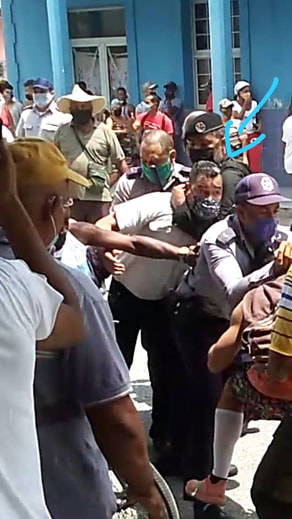|
On July 30, 2021, the People’s Provincial Court of Santiago de Cuba denied a Habeas Corpus petition filed on behalf of evangelical Pastor Lorenzo Rosales Fajardo, who has been unjustly held incommunicado for over 4 weeks after having peacefully protested July 11.  July 11, 2021, Pastor Lorenzo Rosales Fajardo being apprehended by State police in Palma Soriano, Santiago de Cuba. July 11, 2021, Pastor Lorenzo Rosales Fajardo being apprehended by State police in Palma Soriano, Santiago de Cuba. On July 11, Pastor Rosales saw a group of individuals organizing near his home in Santiago de Cuba to peacefully protest repression of fundamental liberties, economic deficiencies, and other difficulties faced by the Cuban people. The Pastor and his 17-year-old son joined the march as the group headed to Palma Soriano. State police then surrounded the protestors, intent on arresting any that did not disperse immediately. Pastor Rosales tried to explain to authorities that they were peacefully protesting. The crowd moved on until they arrived in front of a local government building in Palma Soriano, at which point riot police and “Black Berets” attacked the crowd and arrested several protestors including the Pastor and his son. Pastor Rosales’s wife, Maridilegnis Carballo, was not told of her husband and son’s whereabouts until July 17, when the 17-year-old was returned home late at night. Pastor Rosales and his son had been separated several days earlier, so the young man did not know where his father was taken. The next day, Carballo found the location of her husband after prison records were reviewed. She returned on the 24th to the Versalles operations center in Santiago de Cuba, where she was able to leave her husband toiletries and medication required for a pre-existing health condition. On July 27, Carballo filed a petition for habeas corpus on behalf of her husband prepared by a GLA legal expert in Cuba. In the petition, the Pastor’s wife alleged he was not made aware of what charges were being brought against him, and charges of public disorder applied to other participants in the July 11 demonstrations did not seem reciprocal to the ongoing detention of an individual that peacefully expressed his rights to assembly and speech. GLA’s legal expert in Cuba commented on the denied application stating, “I didn’t expect anything less from a court that answers to state interests in its double function of enacting justice in Cuba. What did get my attention was how the [State] attorney assigned to his case was under the impression that he was hired only for the most serious crime [of public disorder].” Pastor Rosales’ family only learned of the numerous charges filed against him once they were revealed in the denial of habeas corpus. In the ruling by the People’s Provincial Court of Santiago de Cuba, Judge Nerelvis Luna Labrada claimed the accused had been informed of charges the day after his arrest, on July 12, and after a preparatory phase was filed and processed by a criminal investigation unit of Palma Soriano, a precautionary measure of provisional prison was imposed on July 17, for assault, public disorder, resistance and damages. Judge Luna goes on to write that “compelling evidence” in the case justifies the precautionary measure of provisional prison. She also claims that though Article 56 of the Cuban Constitution protects the rights of assembly, demonstration and association for lawful and peaceful purposes, the petitioner failed to address the restrictions placed on these individual rights: instances where “the supreme leader of the revolution is being offended” are not licit or peaceful in nature. To date, Carballo has been unable to speak with her husband, who is still detained in provisional prison in Santiago de Cuba. She has been threatened that if she continues to speak out about Pastor Rosales’s case, there could be negative repercussions for her 17-year-old son. Comments are closed.
|
NewsCategories
All
|
-
About Us
- Working Groups
-
Featured Case Work
- The Cadet Newspaper at VMI
- Free Yorubas of Cuba, Regularly Attacked for Faith
- Alina Lopez-Miyares, US Citizen Tried by Cuban Tribunal
- Jamshid Sharmahd, Businessman and Broadcaster Kidnapped into Iran
- Roberto Quiñones, Jailed for Journalism
- José Daniel Ferrer and UNPACU Activists
- Rigal-Expósito Family, Torn Apart for Homeschooling
- Tejeda-Lescaille Family, Persecuted for Jewish Faith
- The Whittaker Chambers Farm
- Past Cases >
- News & Media
- Donations
- Tips


